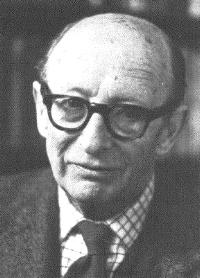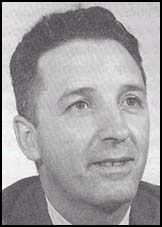Do
Dobrolyubov, Nikolai (1836-1861)
Russian journalist, critic and revolutionary activist.
Dobb, Maurice Herbert (1900-1976)
 For many decades, Maurice H. Dobb was recognized as the most relevant Marxist economist in western academia.
For many decades, Maurice H. Dobb was recognized as the most relevant Marxist economist in western academia.
Author of many books, papers and pamphlets, he developed both an educational role at Cambridge, where he taught almost uninterruptedly for more than 4 decades, until his retirement at the end of the academic year in 1967, and in the communist party press and educational organizations like the Labour Research Department. He published a large number of popular pamphlets on Marxism, the U.S.S.R, the economics of socialism and on capitalism development and crisis.
In 1919, at the same moment he began his academic career, he joined the Communist Party of Great Britain and stayed as a loyal militant until his death.
His book Studies in the Development of Capitalism (1946) remains a masterpiece in the Marxist historical tradition, and in fact it was the main contribution to the political economy perspective in the generation of studies of the new British Marxist historiography developed mainly by the communist historians of the Historians’ Group (E. Hobsbawm, Christopher Hill, E.P. Thompson, Raphael Samuel among others).
Deeply convinced that Marxist economics was the logical successor to classical political economy, he tried to develop and apply Marxist economics to problems that conventional economics was unable to analyze correctly, such as imperialism or socialism.
He joined as an assistant to Piero Sraffa in the project to publish the complete works of David Ricardo. Dobb thought that the publication in 1960 of Piero Sraffa’s book The Production of Commodities by Means of Commodities made a severe contribution to the critique of neoclassical economics, and represented a rehabilitation of classical economics and with it, of the Marxian theory of value. For Dobb, “neo-Ricardianism” appeared as an academic ally of great importance in defending the academic weight of the Marxist economy. His latest book Theories of Surplus Value (1973) is an important inquiry into this perspective.
As Ronald Meek said in his obituary for the Proceedings of the British Academy:
“Looking at Dobb’s life and work as a whole, one is struck in particular by two things. The first is that although he was from the beginning a convinced Marxist, he always firmly resisted, in all its manifestations, the vulgar notion that Marx’s ideas constituted a kind of self-contained, encapsulated system which had had no history and was incapable of further development. On the contrary, he always insisted that there was an important sense in which Marx as an economist had worked within a broad analytical tradition established much earlier by Smith and Ricardo (a fact which suggested a ready way of introducing Marx to British audiences); that Marxian economics could and should be developed, and even where necessary transcended; and that this should be done not only with the aid of tools fashioned by Marxists, but also with the aid of at least some of those fashioned by “bourgeois” economists. (…)
The second thing which strikes one about Dobb’s life and work -and it is something which I think he himself would have liked to see emphasized-is the way in which throughout his whole life his political and academic activities were so closely linked together, with no loss of integrity and very little sense of strain. He always considered it part of his everyday duty, as a politically conscious academic, to make the results of his research available not only to the cognoscenti but also to interested lay people. And his popular books and pamphlets, whatever their level of discourse, are marked by the same meticulous scholarship, precision of argument, and refusal to make concessions to dogmatism, as his major “academic” works. The other dimension of this which should be noted is that the level of objectivity which Dobb managed to achieve in all his work was very high-quite remarkably high, in fact, if one remembers the political circumstances in which he found himself.”
(Ronald L. Meek (1979) Portrait, Challenge, 22:5, 60-65)
Main books by Maurice Dobb
Capitalist Enterprise and Social Progress, London: Routledge, 1925.
Russian Economic Development since the Revolution. Assisted by H. C. Stevens. London: G. Routledge & Sons, 1928.
Wages, London: Nisbet and Co., 1928, 1956.
Russian Economic Development since the Revolution. London: Routledge, 1928.
Political Economy and Capitalism: Some essays in economic tradition, London: Routledge 1937, 1940.
Studies in the Development of Capitalism, London: Routledge 1946, 1963.
Soviet Economic Development Since 1917, London: Routledge and Keegan Paul, 1948, 1966.
Some Aspects of Economic Development: Three Lectures, Delhi: Ranjit Printers and Publishers, 1951.
On Economic Theory and Socialism: Collected Papers. London: Routledge and Kegan Paul, 1955.
An Essay on Economic Growth and Planning, London: Routledge and Kegan Paul, 1960.
Papers on Capitalism, Development and Planning, London: Routledge and Kegan Paul, 1967.
Welfare Economics and the Economics of Socialism: Towards a Commonsense Critique. Cambridge: Cambridge University Press, 1969.
Theories of Value and Distribution Since Adam Smith: Ideology and Economic Theory. London: Cambridge University Press, 1973.
See Maurice Dobb Archive.
Dobbs, Farrell (1907-1983)
 American Trotskyist, best identified as a
leader of the SWP (US) and a central figure in the Minneapolis Teamsters
Strike of 1934. Dobbs was radicalized during the Depression and became a
militant union leader as a coal worker in Minneapolis, MN. He remained
active in union struggles as an elected teamster local official and then as
the trade union director for the SWP, which he discussed with Trotsky in
Mexico. Dobbs, along with several others were convicted and served a prison
term under the Smith Act in 1941. He was editor of The Militant for a
period and also an SWP candidate for presidency in 1948, '52, '56 and '60.
He also authored a four part series [Teamster Rebellion, Teamster Power, Temster Politics and Teamster Bureacracy, Pathfinder Press, New York] on the history of the 1934 Minneapolis Teamster Strikes and subsequent Teamster organizing drives throughout the mid-west of the United States remain a handbook for Communist trade union work to this day.
American Trotskyist, best identified as a
leader of the SWP (US) and a central figure in the Minneapolis Teamsters
Strike of 1934. Dobbs was radicalized during the Depression and became a
militant union leader as a coal worker in Minneapolis, MN. He remained
active in union struggles as an elected teamster local official and then as
the trade union director for the SWP, which he discussed with Trotsky in
Mexico. Dobbs, along with several others were convicted and served a prison
term under the Smith Act in 1941. He was editor of The Militant for a
period and also an SWP candidate for presidency in 1948, '52, '56 and '60.
He also authored a four part series [Teamster Rebellion, Teamster Power, Temster Politics and Teamster Bureacracy, Pathfinder Press, New York] on the history of the 1934 Minneapolis Teamster Strikes and subsequent Teamster organizing drives throughout the mid-west of the United States remain a handbook for Communist trade union work to this day.
Dollinger, Genora Johnson (1913-1995)
Genora Dollinger became a socialist as a youth and was militantly active in the U.S. Socialist Party and Socialist Workers Party as an organizer and as a candidate for public office in the 40s and 50s. She is most remembered for her instrumental role in organizing women in the U.S. auto industry, especially the successful Flint sit-down strike of 1936-1937. The Flint strike is recognized as a key battle in the drive for industrial unionism following the class struggle resulting from the depression. Her recollections in Striking Flint chronicle the specifics and context of the event.
Doriot, Jacques (1888-1940s)
French communist turned fascist. Expelled from the French Communist Party. Supporter of Hitler. Believed to have been killed during WWII in Germany.
Dorrenbach, Heinrich (1888–1919) .
Office worker, Social Democrat, secretary of association of office workers in the Rhineland in 1910. Volunteered for army in 1914, became second lieutenant. Reduced to ranks and discharged in 1917, active in strikes of January 1918. In November, tried to organise Red Guard, and then took command of People’s Naval Division. Associated with Liebknecht, advocated insurrection in January 1919, and was disavowed by the sailors. Took refuge in Brunswick where he barely escaped capture by the Free Corps; arrested in Eisenach, killed ‘whilst trying to escape’.
Dönniges, Helene von (1845-1911)
Daughter of the Franz von Dönniges. Ferdinand Lassalle was killed in a duel to gain her hand in marriage.
Dowson, Ross
Born September 4, 1917; died February 17, 2002.
Born into a working class Toronto family, the third of seven children. His father was a printer of anarchist sympathies, who encouraged his children to think for themselves. As a teenager he formed a Spartacus club and attended Trotskyist meetings and Cooperative Commonwealth Federation (social democratic) meetings.
He helped lead the Canadian Trotskyist movement in 1939 and the post-war period. He maintained close links with the Socialist Workers' Party in the US and the United Secretariat of the Fourth International. The Fair Play for Cuba Committee, the anti-Vietnam War movement and abortion rights for women were important political priorities in the 1960s and 70s.
In 1979, the Royal Canadian Mounted Police (RCMP) admitted to having distributed reports of Dowson's mental instability, to discredit him with his followers. His seven-year law-suit against the RCMP, although legally unsuccessful, is studied in the course work of some Canadian law schools.
In 1988 he suffered a stroke and was hospitalized for the remainder of his life.
Alastair Campbell